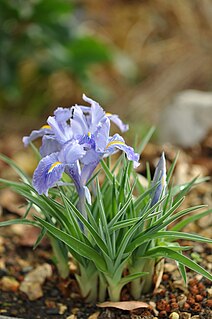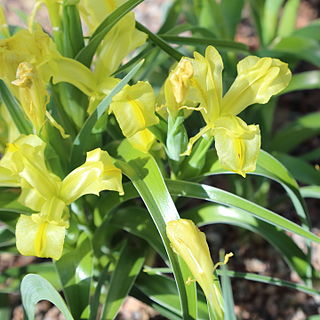Iris albomarginata is a species in the genus Iris, in the subgenus Scorpiris. It is a bulbous perennial, from the mountains in the former Russian states of Kyrgyzstan and Tajikistan.

Iris graeberiana is a species in the genus Iris, in the subgenus of Scorpiris. It is a bulbous perennial.
Iris narynensis is a plant species in the genus Iris, it is also in the subgenus of Scorpiris. It is a bulbous perennial.

Iris palaestina is a species in the genus Iris; it is also in the subgenus Scorpiris. It is a bulbous perennial from Asia, the Palestine region, Lebanon, Syria and Turkey. It has long, narrow, strap-like leaves, and a short stem. The early blooming, fragrant flowers are greenish-grey/white or yellow-white.

Iris planifolia is a species of flowering plant in the subgenus Scorpiris of the genus Iris, family Iridaceae. This bulbous perennial from Europe and North Africa has long, shiny green leaves, a short stem, and large scented flowers in various shades of blue.

Iris rosenbachiana, the spinster iris, is a species in the genus Iris, it is also in the subgenus Scorpiris. It is a bulbous perennial from Central Asia, within Tajikistan and Afghanistan. It has long mid-green leaves, short flower stem, sweet scented flowers in early spring in shades of purple.
Iris vicaria is a species in the genus Iris, it is also in the subgenus Scorpiris. It is a bulbous perennial from Asia, found in Tajikistan, Turkmenistan and Uzbekistan. It has tall arching leaves, and has varied coloured flowers, with white, blue and purple between April and May.
Iris warleyensis is a species in the genus Iris, it is also in the subgenus Scorpiris. It is a bulbous perennial from Central Asia, Tajikistan, Turkmenistan and Uzbekistan. It has long arching mid-green leaves, thin stem and spring flowers in shades of blue.
Iris zenaidae is a species in the genus Iris, it is also in the subgenus Scorpiris. It is a bulbous perennial from Central Asia. It has deep violet-blue or cobalt blue flowers.
Iris willmottiana is a species in the genus Iris, in the subgenus Scorpiris. It is a bulbous perennial, from Uzbekistan in central Asia. It has green broad leaves, short stems, large flowers in various shades of blue.
Iris orchioides, the 'orchid iris,' is a plant species in the genus Iris, it is also in the subgenus Scorpiris. It is a bulbous perennial, from the mountains of Uzbekistan and Kyrgyzstan. It has dark green leaves, slender stems, up to 3 yellow flowers in spring. It is cultivated as an ornamental plant in temperate regions.

Iris maracandica is a species in the genus Iris, it is also in the subgenus Scorpiris. It is a bulbous perennial from Uzbekistan, Central Asia. It has short stems, scented spring flowers in shades of yellow.
Iris kuschakewiczii is a species in the genus Iris, it is also in the subgenus Scorpiris. It is a bulbous perennial, from the hills of Kazakhstan. It has dark green glaucous leaves, a short, thick stem, spring flowers in shades of purple.

Iris stenophylla is a species in the genus Iris, it is also in the subgenus Scorpiris. It is a bulbous perennial.

Iris tubergeniana is a species in the genus Iris, it is also in the subgenus Scorpiris. It is a bulbous perennial from Central Asia, in the former states of USSR. It has pale green, pointed or sickle shaped leaves, short flowering stem holding 1-3 spring flowers in shades of yellow.
Iris loczyi is a beardless iris in the genus Iris, in the subgenus Limniris and in the series Tenuifoliae of the genus. It is a rhizomatous herbaceous perennial, from a wide area of Asia, including Afghanistan, Iran, Kazakhstan, Tajikistan, Mongolia, Tibet and China. It has long thin grey green leaves, long stems and 1 flower in pale violet, blue violet, lavender or light blue.
Iris falcifolia is a plant species in the genus Iris, it is also in the subgenus Iris and in the section Hexapogon. It is a rhizomatous perennial, from Uzbekistan, Kazakhstan, Afghanistan, Iran and Pakistan. It is a small plant, with sickle-shaped greyish-green leaves, lilac-violet flowers and darker veining, and a white or yellow beard. It is cultivated as an ornamental plant in dry, temperate regions.

Iris hoogiana is a plant species in the genus Iris, it is also in the subgenus Iris and in the section Regelia. It is a rhizomatous perennial, from the grassy mountainsides of Turkestan. It has long green leaves, which are slightly purple at the base, and a long slender flowering stem. The flowers are blue, ranging from sky-blue to lavender blue and blue purple. It has orange or yellow beards. It is cultivated as an ornamental plant in temperate regions.

Iris stolonifera is a plant species in the genus Iris; it is also in the subgenus Iris, and in the section Regelia. It is a rhizomatous perennial, from the mountains of Turkestan, between Tajikistan, Uzbekistan and Afghanistan. It has red-skinned stolon roots and rhizomes, glaucous, long, blue-grey leaves, and bi-coloured flowers, in various shades from milky white, to blue, purple, pale lilac, lavender and brown. It normally has blue to yellow beards on all the petals.
Iris alexeenkoi is a plant species in the genus Iris, it is also in the subgenus Iris. It is a rhizomatous perennial, from the Caucasus mountains in Azerbaijan. It has green or greyish grass-like leaves, a short slender stem and 1–2 flowers that come in shades of purple, violet, purple-blue, or blue. It is closely related to Iris pumila. It is rarely cultivated as an ornamental plant in temperate regions.








